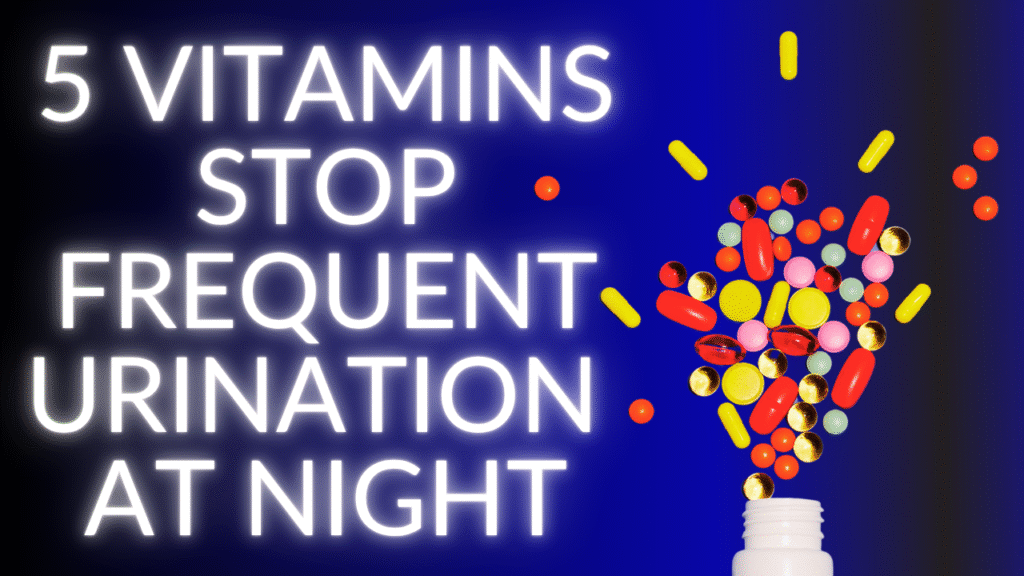
Are you constantly waking up at night to rush to the bathroom? Does this frequent urination disturb your sleep and leave you feeling groggy, irritable, and drained during the day?
You’re not alone.
This common issue—called nocturia—affects millions of people worldwide, especially those over the age of 40 and individuals managing chronic conditions like diabetes, overactive bladder (OAB), or enlarged prostate.
But here’s the good news:
5 essential vitamins can help reduce those nighttime bathroom visits naturally—without drugs or invasive procedures—so you can finally get the deep, uninterrupted sleep your body craves.
🌙 What Is Nocturia and Why It Disrupts Your Sleep
Nocturia is the medical term for frequent urination during the night. It not only interrupts your sleep cycles but also leads to:
- Daytime fatigue
- Poor concentration
- Mood changes
- Weakened immunity
Chronic nocturia may even increase the risk of heart disease, depression, and metabolic disorders due to poor sleep.
🚨 Common Causes of Nighttime Urination
1. Diabetes & High Blood Sugar
Elevated blood glucose levels make your kidneys filter more fluid, which leads to more urine—especially during the night.
2. Overactive Bladder or UTIs
These conditions make your bladder signal the need to urinate, even when it’s not full.
3. Enlarged Prostate in Men (BPH)
Benign Prostatic Hyperplasia can block normal urine flow, causing incomplete emptying and frequent urination at night.
4. Aging and Hormonal Changes
Older adults produce less antidiuretic hormone, which helps retain fluid during sleep.
5. Lifestyle Habits
Late-night fluid consumption, caffeine, alcohol, or diuretic medications can all contribute to nocturia.
🌟 The Vitamin Deficiency Link
Many people suffering from nocturia are actually deficient in key vitamins that support bladder health, muscle function, and inflammation control. Let’s explore the top 5 vitamins that help relieve frequent nighttime urination naturally.
🔆 Vitamin #1: Vitamin D – The Bladder Inflammation Fighter
Low levels of vitamin D are directly linked to overactive bladder and frequent urination. This powerhouse nutrient:
- Supports bladder muscle control
- Reduces inflammation
- Helps prevent bladder infections
Best Sources of Vitamin D:
☀️ Sun exposure (15–20 minutes daily)
🐟 Fatty fish (salmon, mackerel)
🥚 Egg yolks
🥛 Fortified dairy and cereals
Supplement Tip: If you live in an area with limited sunlight or are over 50, ask your doctor about supplementing with vitamin D3 for better absorption.
🧘♂️ Vitamin #2: Magnesium – The Muscle Relaxer
Magnesium helps calm overactive bladder muscles and improves nerve signaling. A deficiency may cause your bladder to contract when it shouldn’t, increasing urgency at night.
Benefits of Magnesium for Bladder Health:
- Relaxes detrusor (bladder) muscles
- Reduces spasms
- Enhances urinary control
Top Magnesium-Rich Foods:
🥬 Spinach, kale
🥜 Almonds, cashews
🌾 Quinoa, brown rice
🎃 Pumpkin seeds
Supplement Tip: Choose magnesium glycinate for better absorption and fewer digestive side effects.
🍊 Vitamin #3: Vitamin C – The Bladder Shield
This antioxidant superstar strengthens the bladder lining and protects it from infection and oxidative damage. It also helps acidify urine, making it harder for bacteria to grow.
Top Vitamin C Foods:
🍋 Citrus fruits
🫑 Bell peppers
🍓 Berries
🥦 Broccoli, kale
Pro Tip: While vitamin C is crucial, avoid high-dose supplements that may irritate the bladder—stick to food-based sources or buffered vitamin C.
🦪 Vitamin #4: Zinc – The Prostate Protector
Zinc is especially vital for men. It supports prostate health, reduces inflammation, and helps control bladder function.
How Zinc Helps:
- Supports immune defense against UTIs
- Shrinks enlarged prostate tissue
- Aids tissue repair and hormone balance
Best Food Sources:
🦪 Oysters
🥩 Red meat, poultry
🌰 Pumpkin seeds
🥣 Lentils
Important Note: Don’t overdo zinc supplements, as excessive intake can block copper absorption and harm immunity.
🧠 Vitamin #5: Vitamin B12 – The Nerve Protector
B12 is essential for nerve communication between the brain and bladder. A deficiency can lead to nerve damage, urgency, and poor bladder control—especially in seniors and vegetarians.
Top B12 Sources:
🥩 Meat and liver
🥚 Eggs
🥛 Dairy products
🥣 Fortified cereals
If you experience fatigue, numbness, or tingling along with nocturia, get your B12 levels tested and discuss supplementation with your healthcare provider.
🛌 Simple Lifestyle Hacks to Reduce Nighttime Urination
To enhance the effects of these vitamins, try these evidence-based lifestyle tips:
✅ Avoid caffeine and alcohol in the evening
✅ Limit fluid intake 2–3 hours before bedtime
✅ Elevate legs during the day to reduce fluid buildup
✅ Do pelvic floor exercises (Kegels) daily
✅ Manage blood sugar levels effectively
✅ Stick to a regular sleep-wake cycle
💤 Sleep Deeper, Live Better
Nocturia can feel frustrating—but the solution doesn’t always require medication. With the right mix of nutritional support and simple lifestyle changes, you can take control of your bladder health and finally enjoy uninterrupted, restful sleep.
Take Action Today:
Incorporate Vitamin D, Magnesium, Vitamin C, Zinc, and B12 into your daily routine and reclaim your nights.
💬 Have you tried any of these vitamins for bladder health?
What worked best for you? Share your experience in the comments below!
Tag your friends who wake up at night often—they’ll thank you.
And don’t forget to BOOKMARK for more natural health tips.
